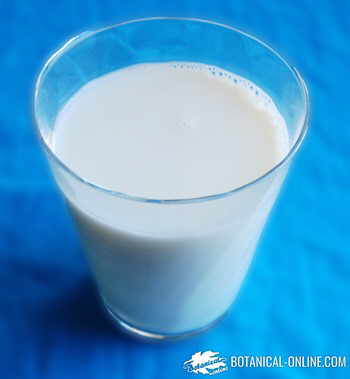Contents
Health benefits of milk
Food properties of milk
Milk is the most complete food. It provides all the necessary nutrients (only deficient in vitamin C, iron and fiber).
 Milk is very recommended nutritionally. It is a very suitable food for its high nutrient content, for situations when new tissues are being formed in the body, such as:
Milk is very recommended nutritionally. It is a very suitable food for its high nutrient content, for situations when new tissues are being formed in the body, such as:
- Growth in children and adolescents
- Pregnancy and breast-feeding,
- Non digestive surgical procedures.
- Serious injuries and trauma or bone fractures.
- In addition, the proper intake of the recommended daily allowance prevents the development of osteoporosis in the future.
Milk is rich in minerals, especially calcium
Calcium is not only a good ally of bones. It has been shown that calcium deficiency may be responsible for circulatory problems such as stroke, high blood pressure or cramping in the legs. Similarly, calcium helps to heal wounds.
In addition to calcium, milk supplies energy and other basic nutrients. It is a source of potassium, magnesium, phosphorus and zinc.
Milk contains many vitamins
As for vitamins, milk contains mainly vitamin A and vitamin B, both of them essential for proper functioning of the organism. Vitamin D can occur in varying amounts depending on the process milk is being subjected and as an added product.
Because of its vitamin B content, milk is very interesting to maintain the health of the mind and nerves in good condition. Vitamin B strengthens the defenses, produces energy from food, takes care of cardiovascular health and it is necessary for the formation of many enzymes, proteins and hormones.
Intake of vitamin B from milk is advantageous to prevent the occurrence of anomalies caused by deficiency of vitamin A. Among which, we can mention the following:
- Delay in growth.
- Brittle nails, slow growing nails.
- Defective teeth
- Dry hair, brittle hair, slow hair growth.
- Dry, rough skin, rashes, scaly skin, wrinkles,
- Night blindness, vision loss, dry eyes
Milk and other dairy products are often fortified with vitamin D, which enhances the absorption of calcium.
When is it beneficial to increase the consumption of milk?
There are situations where you should increase the consumption of dairy products to ensure an adequate intake of calcium and minimize the symptoms of some diseases, such as in the case of dental problems or diseases of the bones.
Recommendations for patients with different pathologies. When controlling the consumption of milk?
Depending on the different diseases and different patients, the recommendations may vary. We must bear in mind that there are situations where one must control the consumption of dairy products, but this does not involve the total elimination of milk.
Because of its sugar content, saturated fats or cholesterol, usually this control is done in cases in which you have, for example, dyslipidemia (cholesterol and triglycerides), obesity or overweight and cardiovascular disease.
This is recommended both to restrict calories and because of the type of fat in milk.
Instead of whole milk or whole milk products, one is advised to consume skimmed milk or non-fat dairy products, rather than the whole products with a high level of saturated fats and cholesterol.
It will also be better if milk does not contain added sugar or artificial sweeteners that will increase the calories consumed.
Milks containing omega 3 are effective against high cholesterol levels, as long as you make a balanced diet, but this premise needs to be effective.
In other cases such as hypertension the consumption of products such as high salty cheeses are not recommend, because they can increase blood sodium levels and blood pressure.
Because the proinflammatory and acidifying effect of milk, it is also recommended to control its consumption in inflammatory diseases such as Crohn disease or ulcerative colitis. In these cases, it is better to change it with vegetable drinks such as soy milk with a basifying effect.
In case of iron deficiency anemia, ie, lack of iron in the body, it is not recommended to abuse from consumption of milk, because milk is low in this mineral and the high level of satiety that milk consumption causes can prevent taking other foods containing more iron.
Can we always drink milk?
Sometimes it is not enough to control the intake of dairy products. There are diseases where one should completely avoid milk consumption or milk derivatives, because they are contraindicated
![]() More information on milk
More information on milk








